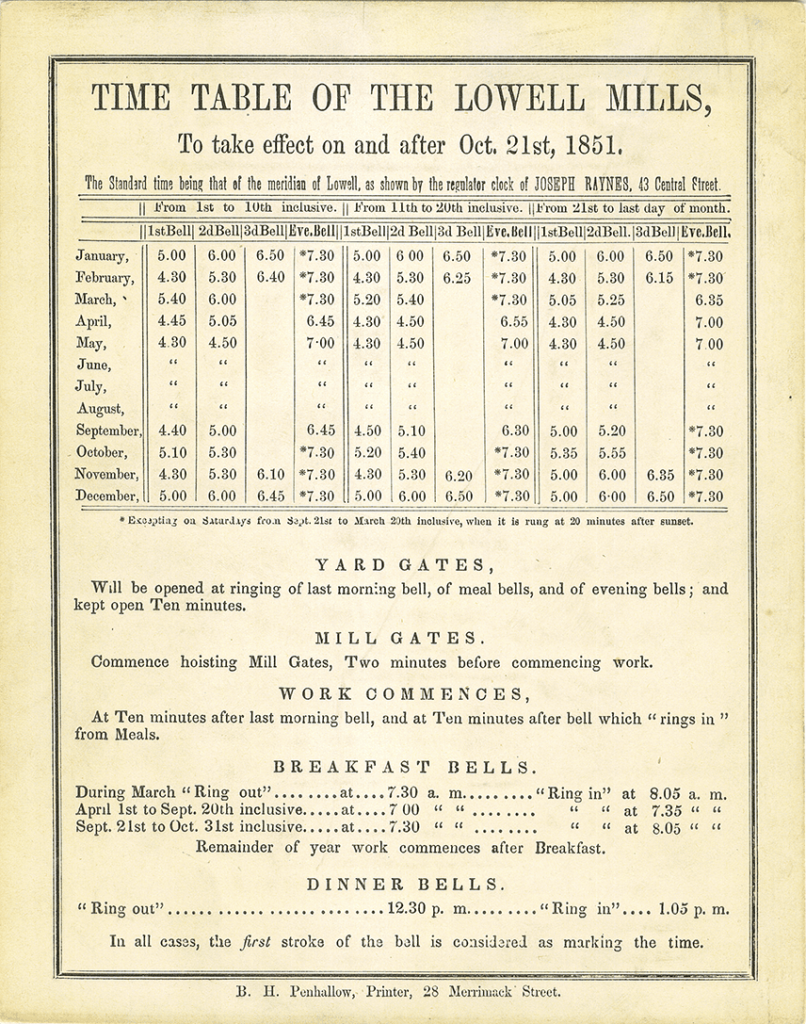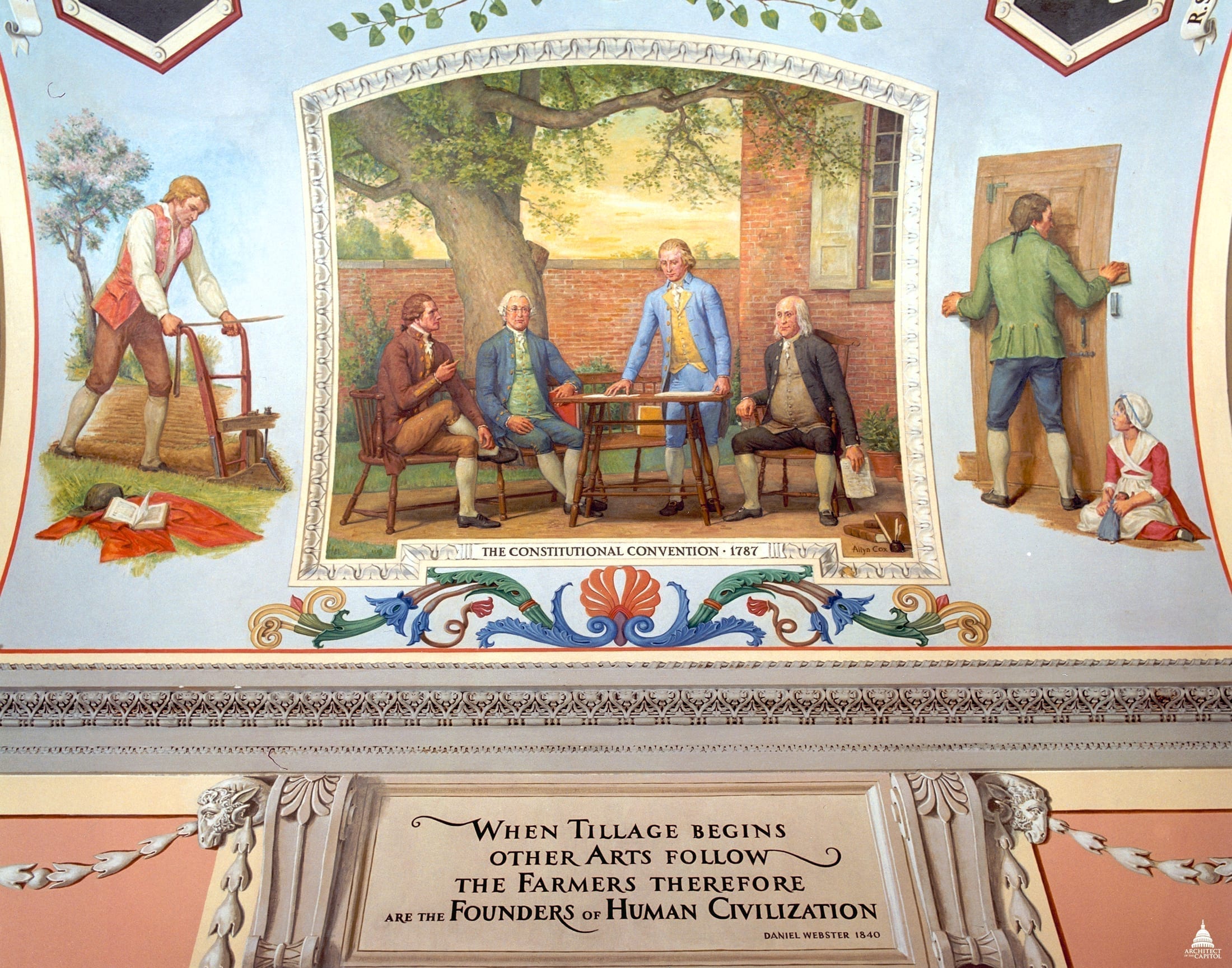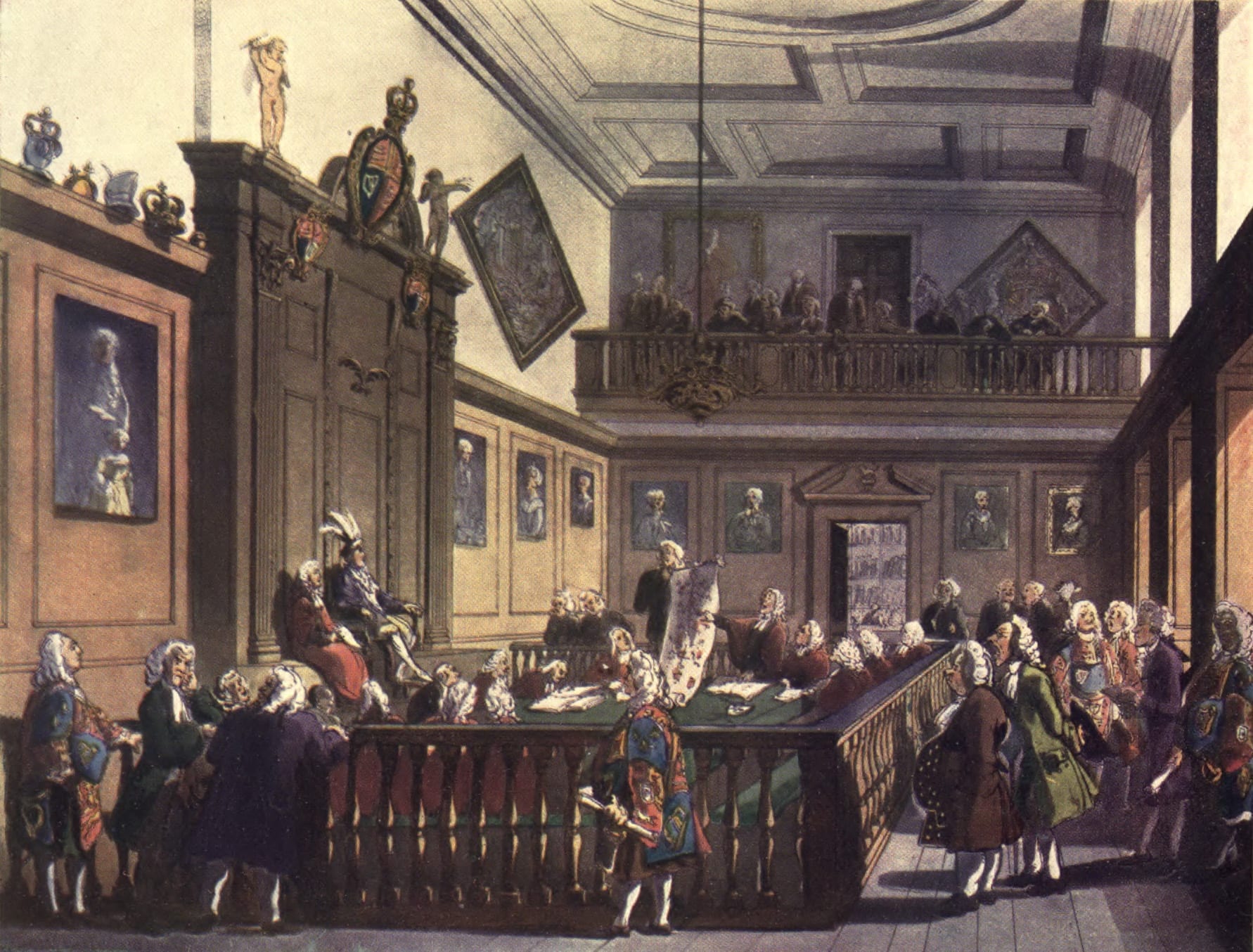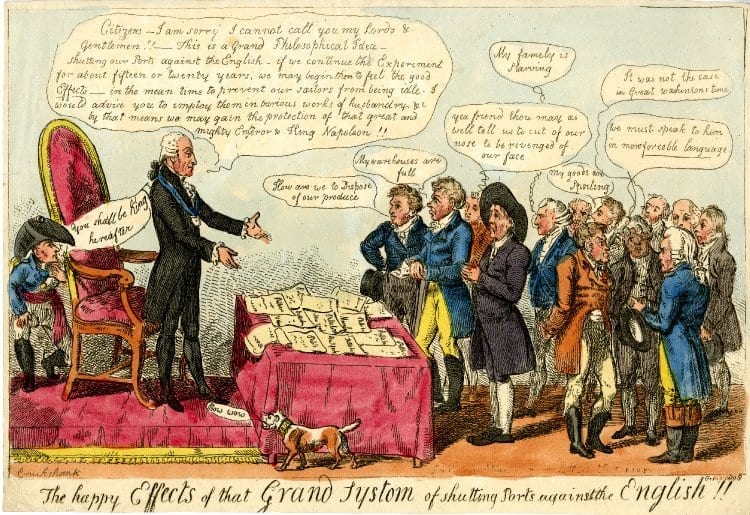
Introduction
Founded in the 1820s and named after Francis Cabot Lowell, the inventor of the American power loom, Lowell, Massachusetts, was one of the nation’s most ambitious planned industrial projects. There, at the convergence of two rivers, a group of investors known as the Boston Associates constructed a number of large brick workshops to house the water-powered equipment necessary for each stage of the textile manufacturing process. By consolidating all the stages (cleaning and carding the cotton or wool fibers, spinning them into threads, and finally weaving them into cloth) into one location and relying on the water-powered machines, the Associates were able to produce yardage more efficiently and economically than companies that relied on traditional methods.
By 1840, the city was among the largest manufacturing centers in the United States, its various mills employing thousands of workers. Most of the factory hands were single women, a mixture of immigrants and girls from farming communities around the state who were looking for an opportunity to either contribute to their family’s economic success or to achieve a little bit of financial independence. The “factory girls,” as they were called, signed annual contracts with the companies that owned the mills, which specified that they would live in the company-run boardinghouses, attend church, and follow the time tables and other rules and regulations for moral community living.
As the Lowell system of factory work became more prevalent, so too did the public debate over the justice and morality of such labor. Labor organizers routinely called for a reduction in working hours, citing the ill effects upon the health and morale of workers. Although legislators were often slow to intervene in freely-entered contracts between management and labor, in most states, protective legislation of various kinds did eventually pass, if only to alleviate the concerns and criticisms of labor reformers like Orestes Bronson and William West.
Documents in this chapter are available separately by following the hyperlinks below:
- Orestes Bronson, The Laboring Classes, 1840
- “Song of the Spinners,” Lowell Offering, April 1841
- Massachusetts Lawmakers Investigate Working Conditions, 1845
- William West, “Wages Slavery and Chattel Slavery,” April 2 and 23, 1847
- Time Table for Lowell Mills, c. 1851
Orestes Bronson, The Laboring Classes, 18401
It may be laid down as a general rule, with but few exceptions, that men are rewarded in an inverse ratio to the amount of actual service they perform. Under every government on earth the largest salaries are annexed to those offices, which demand of their incumbents the least amount of actual labor either mental or manual. And this is in perfect harmony with the whole system of repartition of the fruits of industry, which obtains in every department of society. Now here is the system which prevails, and here is its result. The whole class of simple laborers are poor, and in general unable to procure anything beyond the bare necessaries of life.
In regard to labor two systems obtain; one that of slave labor, the other that of free labor. Of the two, the first is, in our judgment, except so far as the feelings are concerned, decidedly the least oppressive. If the slave has never been a free man, we think, as a general rule, his sufferings are less than those of the free laborer at wages. As to actual freedom one has just about as much as the other. The laborer at wages has all the disadvantages of freedom and none of its blessings, while the slave, if denied the blessings, is freed from the disadvantages. We are no advocates of slavery, we are as heartily opposed to it as any modern abolitionist can be; but we say frankly that, if there must always be a laboring population distinct from proprietors and employers, we regard the slave system as decidedly preferable to the system at wages. It is no pleasant thing to go days without food, to lie idle for weeks, seeking work and finding none, to rise in the morning with a wife and children you love, and know not where to procure them a breakfast, and to see constantly before you no brighter prospect than the almshouse. . . .
We pass through our manufacturing villages; most of them appear neat and flourishing. The operatives are well dressed, and we are told, well paid. They are said to be healthy, contented, and happy. This is the fair side of the picture; the side exhibited to distinguished visitors. There is a dark side, moral as well as physical. Of the common operatives, few, if any, by their wages, acquire a competence. . . . [T]he great mass wear out their health, spirits, and morals, without becoming one whit better off than when they commenced labor. The bills of mortality in these factory villages are not striking, we admit, for the poor girls when they can toil no longer go home to die. The average life, working life we mean, of the girls that come to Lowell, for instance, from Maine, New Hampshire, and Vermont, we have been assured, is only about three years. What becomes of them then? Few of them ever marry; fewer still ever return to their native places with reputations unimpaired. “She has worked in a Factory,” is almost enough to damn to infamy the most worthy and virtuous girl. We know no sadder sight on earth than one of our factory villages presents, when the bell at break of day, or at the hour of breakfast, or dinner, calls out its hundreds or thousands of operatives. We stand and look at these hard-working men and women hurrying in all directions, and ask ourselves, where go the proceeds of their labors? The man who employs them, and for whom they are toiling as so many slaves, is one of our city nabobs, reveling in luxury; or he is a member of our legislature, enacting laws to put money in his own pocket; or he is a member of Congress, contending for a high Tariff to tax the poor for the benefit of the rich; or in these times, he is shedding crocodile tears over the deplorable condition of the poor laborer, while he docks his wages twenty-five per cent building miniature log cabins, shouting Harrison and “hard cider.” And this man too would fain pass for a Christian and a republican. He shouts for liberty, stickles for equality, and is horrified at a Southern planter who keeps slaves. . . .
The slave system . . . in name and form, is gradually disappearing from Christendom. It will not subsist much longer. But its place is taken by the system of labor at wages, and this system, we hold, is no improvement upon the one it supplants. Nevertheless the system of wages will triumph. It is the system which in name sounds honester [sic] than slavery, and in substance is more profitable to the master. It yields the wages of iniquity, without its opprobrium. It will therefore supplant slavery, and be sustained for a time.
Now, what is the prospect of those who fall under the operation of this system? We ask, is there a reasonable chance that any considerable portion of the present generation of laborers, shall ever become owners of a sufficient portion of the funds of production, to be able to sustain themselves by laboring on their own capital, that is, as independent laborers? We need not ask this question, for everybody knows there is not. Well, is the condition of a laborer at wages the best that the great mass of the working people ought to be able to aspire to? Is it a condition, nay can it be made a condition, with which a man should be satisfied, in which he should be contented to live and die? . . .
Let us not be misinterpreted. We deny not the power of Christianity. Should all men become good Christians, we deny not that all social evils would be cured. But we deny in the outset that a man, who seeks merely to save his own soul, merely to perfect his own individual nature, can be a good Christian. The Christian forgets himself, buckles on his armor, and goes forth to war against principalities and powers, and against spiritual wickedness in high places. No man can be a Christian who does not begin his career by making war on the mischievous social arrangements from which his brethren suffer. He who thinks he can be a Christian and save his soul, without seeking their radical change, has no reason to applaud himself for his proficiency in Christian science, nor for his progress towards the kingdom of God. Understand Christianity, and we will admit, that should all men become good Christians, there would be nothing to complain of. But one might as well undertake to dip the ocean dry with a clam-shell, as to undertake to cure the evils of the social state by converting men to the Christianity of the Church.
The evil we have pointed out, we have said, is not of individual creation, and it is not to be removed by individual effort, saving so far as individual effort induces the combined effort of the mass. . . .
Now the evils of which we have complained are of a social nature. That is, they have their root in the constitution of society as it is . . . the action of government, of laws, and of systems and institutions upheld by society, and of which individuals are the slaves. This being the case, it is evident that they are to be removed only by the action of society, that is, by government, for the action of society is government.
But what shall government do? Its first doing must be an undoing.
There has been thus far quite too much government, as well as government of the wrong kind. The first act of government we want, is a still further limitation of itself. It must begin by circumscribing within narrower limits its powers. And then it must proceed to repeal all laws which bear against the laboring classes, and then to enact such laws as are necessary to enable them to maintain their equality. We have no faith in those systems of elevating the working classes, which propose to elevate them without calling in the aid of government. We must have government, and legislation expressly directed to this end.
But again what legislation do we want so far as this country is concerned? We want first the legislation which shall free the government, whether State or Federal, from the control of the Banks. The Banks represent the interest of the employer, and therefore of necessity interests adverse to those of the employed; that is, they represent the interests of the business community in opposition to the laboring community. So long as the government remains under the control of the Banks, so long it must be in the hands of the natural enemies of the laboring classes, and may be made, nay, will be made, an instrument of depressing them yet lower. It is obvious then that, if our object be the elevation of the laboring classes, we must destroy the power of the Banks over the government, and place the government in the hands of the laboring classes themselves, or in the hands of those, if such there be, who have an identity of interest with them.
Back to Top“Song of the Spinners,” Lowell Offering, April 18412
The day is over, no longer will we toil and spin;
For evening’s hush withdraws from the daily din.
And how we sing with gladsome hearts,
The theme of the spinner’s song.
That labor to leisure a zest imparts,
Unknown to the idle throng.
We spin all day, and then, in the time for rest,
Sweet peace is found, A joyous and welcome guest.
Despite of toil we all agree, or out of the Mills or in,
Dependent on others we never will be,
So long as we are able to spin.
Back to TopMassachusetts Lawmakers Investigate Working Conditions, 18453
The Special Committee to which was referred sundry petitions relating to the hours of labor, have considered the same and submit the following Report:
The first petition which was referred to your committee, came from the city of Lowell, and was signed by Mr. John Quincy Adams Thayer, and eight hundred and fifty others, “peaceable, industrious, hard working men and women of Lowell.” The petitioners declare that they are confined “from thirteen to fourteen hours per day in unhealthy apartments,” and are thereby “hastening through pain, disease and privation, down to a premature grave.” They therefore ask the Legislature “to pass a law providing that ten hours shall constitute a day’s work,” and that no corporation or private citizen “shall be allowed except in cases of emergency, to employ one set of hands more than ten hours per day.”
The second petition came from the town of Fall River, and is signed by John Gregory and four hundred and eighty-eight others. These petitioners ask for the passage of a law to constitute “ten hours a day’s work in all corporations created by the Legislature.”
The third petition signed by Samuel W. Clark and five hundred others, citizens of Andover, is in precisely the same words as the one from Fall River.
The fourth petition is from Lowell, and is signed by James Carle and three hundred others. The petitioners ask for the enactment of a law making ten hours a day’s work, where no specific agreement is entered into between the parties.
The whole number of names on the several petitions is 2,139, of which 1,151 are from Lowell. A very large proportion of the Lowell petitioners are females. Nearly one half of the Andover petitioners are females. The petition from Fall River is signed exclusively by males.
In view of the number and respectability of the petitioners who had brought their grievances before the Legislature, the Committee asked for and obtained leave of the House to send for “persons and papers,” in order that they might enter into an examination of the matter, and report the result of their examination to the Legislature as a basis for legislative action, should any be deemed necessary.
On the 13th of February, the Committee held a session to hear the petitioners from the city of Lowell. Six of the female and three of the male petitioners were present, and gave in their testimony.
The first petitioner who testified was Eliza R. Hemmingway. She had worked 2 years and 9 months in the Lowell Factories; 2 years in the Middlesex, and 9 months in the Hamilton Corporations. Her employment is weaving-works by the piece. The Hamilton Mill manufactures cotton fabrics. The Middlesex, woollen fabrics. She is now at work in the Middlesex Mills, and attends one loom. Her wages average from $16 to $23 a month exclusive of board. She complained of the hours for labor being too many, and the time for meals too limited. In the summer season, the work is commenced at 5 o’clock, a.m., and continued till 7 o’clock, p.m., with half an hour for breakfast and three quarters of an hour for dinner. During eight months of the year, but half an hour is allowed for dinner. The air in the room she considered not to be wholesome. There were 293 small lamps and 61 large lamps lighted in the room in which she worked, when evening work is required. These lamps are also lighted sometimes in the morning. About 130 females, 11 men, and 12 children (between the ages of 11 and 14) work in the room with her. She thought the children enjoyed about as good health as children generally do. The children work but 9 months out of 12. The other 3 months they must attend school. Thinks that there is no day when there are less than six of the females out of the mill from sickness. Has known as many as thirty. She, herself, is out quite often, on account of sickness. There was more sickness in the Summer than in the Winter months; though in the Summer, lamps are not lighted. She thought there was a general desire among the females to work but ten hours, regardless of pay. Most of the girls are from the country, who work in the Lowell Mills. The average time which they remain there is about three years. She knew one girl who had worked there 14 years. Her health was poor when she left. Miss Hemmingway said her health was better where she now worked, than it was when she worked on the Hamilton Corporation. She knew of one girl who last winter went into the mill at half past 4 o’clock, a.m., and worked till half past 7 o’clock, p.m. She did so to make more money. She earned from $25 to $30 per month. There is always a large number of girls at the gate wishing to get in before the bell rings. On the Middlesex Corporation one fourth part of the females go into the mill before they are obliged to. They do this to make more wages. A large number come to Lowell to make money to aid their parents who are poor. She knew of many cases where married women came to Lowell and worked in the mills to assist their husbands to pay for their farms. The moral character of the operatives is good. There was only one American female in the room with her who could not write her name.
Miss Sarah G. Bagley said she had worked in the Lowell Mills eight years and a half, six years and a half on the Hamilton Corporation, and two years on the Middlesex. She is a weaver, and works by the piece. She worked in the mills three years before her health began to fail. She is a native of New Hampshire, and went home six weeks during the summer. Last year she was out of the mill a third of the time. She thinks the health of the operatives is not so good as the health of females who do house-work or millinery business. The chief evil, so far as health is concerned, is the shortness of time allowed for meals. The next evil is the length of time employed—not giving them time to cultivate their minds. She spoke of the high moral and intellectual character of the girls. That many were engaged as teachers in the Sunday schools. That many attended the lectures of the Lowell Institute; and she thought, if more time was allowed, that more lectures would be given and more girls attend. She thought that the girls generally were favorable to the ten hour system. She had presented a petition, same as the one before the Committee, to 132 girls, most of whom said that they would prefer to work but ten hours. In a pecuniary point of view, it would be better, as their health would be improved. They would have more time for sewing. Their intellectual, moral and religious habits would also be benefited by the change. Miss Bagley said, in addition to her labor in the mills, she had kept evening school during the winter months, for four years, and thought that this extra labor must have injured her health. . . .
Miss Elizabeth Rowe has worked in Lowell 16 months, all the time on the Lawrence Corporation, came from Maine, she is a weaver, works by the piece, runs four looms. “My health,” she says, “has been very good indeed since I worked there, averaged three dollars a week since I have been there besides my board; have heard very little about the hours of labor being too long.” She consented to have her name put on the petition because Miss Phillips asked her to. She would prefer to work only ten hours. Between 50 and 60 work in the room with her. Her room is better ventilated and more healthy than most others. Girls who wish to attend lectures can go out before the bell rings; my overseer lets them go, also Saturdays they go out before the bell rings. It was her wish to attend four looms. She has a sister who has worked in the mill seven years. Her health is very good. Don’t know that she has ever been out on account of sickness. The general health of the operatives is good. Have never spoken to my employers about the work being too hard, or the hours too long. Don’t know any one who has been hastened to a premature grave by factory labor. . . .
Mr. Gilman Gale, a member of the city council, and who keeps a provision store, testified that the short time allowed for meals he thought the greatest evil. He spoke highly of the character of the operatives and of the agents; also of the boarding houses and the public schools. He had two children in the mills who enjoyed good health. The mills are kept as clean and as well ventilated as it is possible for them to be. . . .
The above testimony embraces all the important facts which were elicited from the persons who appeared before the Committee.
On Saturday the 1st of March, a portion of the Committee went to Lowell to examine the mills, and to observe the general appearance of the operatives therein employed. They arrived at Lowell after an hour’s ride upon the railroad. They first proceeded to the Merrimack Cotton Mills, in which are employed usually 1,200 females and 300 males. They were permitted to visit every part of the works and to make whatever inquiries they pleased of the persons employed. They found every apartment neat and clean, and the girls, so far as personal appearance went, healthy and robust, as girls are in our country towns.
The Committee also visited the Massachusetts and Boott Mills, both of which manufacture cotton goods. The same spirit of thrift and cleanliness, of personal comfort and contentment, prevailed there. The rooms are large and well lighted, the temperature comfortable, and in most of the window sills were numerous shrubs and plants, such as geraniums, roses, and numerous varieties of the cactus. These were the pets of the factory girls, and they were to the Committee convincing evidence of the elevated moral tone and refined taste of the operatives.
The Committee also visited the Lowell and the Middlesex mills; in the first of which carpets are manufactured, and in the second, broadcloths, cassimeres4, &c. These being woolen mills, the Committee did not expect to find that perfect cleanliness which can be and has been attained in cotton mills. It would, however, be difficult to institute a comparison between the mills on this point, or to suggest an improvement. Not only is the interior of the mills kept in the best order, but great regard has been paid by many of the agents to the arrangement of the enclosed grounds. Grass plats have been laid out, trees have been planted, and fine varieties of flowers in their season, are cultivated within the factory grounds. In short, everything in and about the mills, and the boarding houses appeared, to have for its end, health and comfort. The same remark would apply to the city generally. Your committee returned fully satisfied, that the order, decorum, and general appearance of things in and about the mills, could not be improved by any suggestion of theirs, or by any act of the Legislature.
During our short stay in Lowell, we gathered many facts, which we deem of sufficient importance to state in this report, and first, in relation to the Hours of Labor.
From Mr. Clark, the agent of the Merrimack Corporation, we obtained the following table of the time which the mills run during the year.
Begin work. From 1st May to 31st August, at 5 o’clock. From 1st September to 30th April, as soon as they can see.
Breakfast. From 1st November to 28th February, before going to work. From 1st March to 31st of March, at 7 1/2 o’clock. From 1st April to 19th September, at seven o’clock. From 20th September to 31st October, at 7 1/2 o’clock. Return in half an hour.
Dinner. Through the year at 12 1/2 o’clock. From 1st May to 31st August, return in 45 minutes. From 1st September to 30th April, return in 30 minutes.
Quit work. From 1st May to 31st August, at 7 o’clock. From 1st September to 19th September, at dark. From 20th September to 19th March, at 7 1/2 o’clock. From 20th March to 30th April, at dark.
Lamps are never lighted on Saturday evenings. The above is the time which is kept in all the mills in Lowell, with a slight difference in the machine shop; and it makes the average daily time throughout the year, of running the mills, to be twelve hours and ten minutes.
There are four days in the year which are observed as holidays, and on which the mills are never put in motion. These are Fast Day, Fourth of July, Thanksgiving Day, and Christmas Day. These make one day more than is usually devoted to pastime in any other place in New England. The following table shows the average hours of work per day, throughout the year, in the Lowell Mills:
| HOURS | MIN | HOURS | MIN | ||
| January | 11 | 24 | July | 12 | 45 |
| February | 12 | August | 12 | 45 | |
| March | 11 | 52 | September | 12 | 23 |
| April | 13 | 31 | October | 12 | 10 |
| May | 12 | 45 | November | 11 | 56 |
| June | 12 | 45 | December | 11 | 24 |
. . .
In Lowell, but very few (in some mills none at all) enter into the factories under the age of fifteen. None under that age can be admitted, unless they bring a certificate from the school teacher, that he or she has attended school at least three months during the preceding twelve. Nine-tenths of the factory population in Lowell come from the country. They are farmers’ daughters. Many of them come over a hundred miles to enter the mills. Their education has been attended to in the district schools, which are dotted like diamonds over every square mile of New England. Their moral and religious characters have been formed by pious parents, under the paternal roof. Their bodies have been developed, and their constitutions made strong by pure air, wholesome food, and youthful exercise.
After an absence of a few years, having laid by a few hundred dollars, they depart for their homes, get married, settle down in life, and become the heads of families. Such, we believe, in truth, to be a correct statement of the Lowell operatives, and the hours of labor.
THE GENERAL HEALTH OF THE OPERATIVES.
In regard to the health of the operatives employed in the mills, your Committee believe it to be good. The testimony of the female petitioners does not controvert this position, in general, though it does in particular instances. The population of the city of Lowell is now rising 26,000, of which number, about 7,000 are females employed in the mills. It is the opinion of Dr. Kirnball, an eminent physician of Lowell, with whom the Committee had an interview, that there is less sickness among the persons at work in the mills, than there is among those who do not work in the mills; and that there is less sickness now than there was several years ago, when the number was much less than at present. This we understood to be also the opinion of the city physician, Dr. Wells, from whose published report for the present year, we learn that the whole number of deaths in Lowell, during the year 1844, was 362, of which number, 200 were children under ten years of age.
| DISEASES | 1840 | 1841 | 1842 | 1843 | 1844 |
| Consumption | 40 | 54 | 70 | 73 | 77 |
| Inflammation of Lungs | 17 | 20 | 38 | 16 | 24 |
| Cholera Infantum | 12 | 30 | 34 | 27 | 31 |
| Scarlet Fever | 7 | 43 | 32 | 6 | 3 |
| Measles | 0 | 4 | 12 | 0 | 10 |
| Dysentery | 47 | 18 | 17 | 11 | 2 |
| Inflammation of Brain | 7 | 11 | 6 | 8 | 4 |
| Croup | 7 | 10 | 12 | 6 | 11 |
| Total mortality each year* | 426 | 456 | 473 | 363 | 362 |
The preceding table shows the comparative mortality in Lowell during the past five years, enumerating some of the principal diseases.
The population of Lowell, in May, 1840, was 7,341 males and 13,740 females; total, 20,981. The population in May, 1844, was 9,432 males, 15,637 females; total, 25,163; increase of population in four years, 4,182. Notwithstanding this increase of population, the number of deaths has decreased. There being fewer the past year than in any of the four preceding years, and 64 less in 1844 than in 1840. Yet, during the past year, the mills have been in more active operation than during either of the four years preceding. The decrease in the mortality of Lowell, Dr. Wells attributes, in part, to “the enlightened policy of the city government, in directing the construction of common sewers, and the enterprise of individuals, in multiplying comfortable habitations, the establishment of a hospital, supported by the liberality of the corporations, for the accommodation of the sick in their employ. The more general diffusion of a knowledge of the laws of health, is also conducive to the same end.”
The petitioners thought that the statements made by our city physician, as to the number of deaths, were delusive, inasmuch as many of the females when taken sick in Lowell do not stay there, but return to their homes in the country and die. Dr. Kimball thought that the number who return home when seized with sickness was small. Mr. Cooper, whose testimony we have given, and who is a gentleman of great experience, says that he has known but one girl who, during the last eight years, went home from Lowell and died. We have no doubt, however, that many of the operatives do leave Lowell and return to their homes when their health is feeble, but the proportion is not large. Certainly it has created no alarm, for the sisters and acquaintances of those who have gone home return to Lowell to supply the vacancies which their absence had created.
In the year 1841, Mr. French, the agent of the Boott Mills, adopted a mode of ascertaining from the females employed in that mill the effect which factory labor had upon their health. The questions which he put were: “What is your age?” “How long have you worked in a cotton mill?” “Is your health as good as before?”
These questions were addressed to every female in “No. 2, Boott Mill.” The committee have the names of the females interrogated, and the answers which they returned, and the result is as follows:
LIST OF GIRLS IN BOOTT MILL, NO. 2 | May 1st, 1841
| WHERE EMPLOYED | No. OF GIRLS | AVERAGE
AGE* | AVERAGE TIME EMPLOYED IN MILL* | EFFECT
UPON HEALTH | ||
| y. d. | y. d. | Imp'd | As good | Not as good | ||
| Carding room | 20 | 23 30 | 5 25 | 3 | 12 | 5 |
| Spinning room | 47 | 28 38 | 4 10 | 14 | 29 | 4 |
| Dressing room | 25 | 26 60 | 7 10 | 2 | 16 | 7 |
| Weaving room | 111 | 22 98 | 3 84 | 10 | 62 | 39 |
| Whole No. | 203 | 22 85 | 4 29 | 29 | 119 | 55 |
To these questions, several of the girls appended remarks. One girl, named S. Middleton, had worked in a mill nine years. She says, “health quite as good; has not been sick in the time.” Miss Proctor says, “have worked fourteen years; health a great deal better; sick when out of the mill.” A Miss Lawrence says, “have been five years in a mill; health quite as good; not a day’s sickness in the time.” A Miss Clark says, “have been seventeen years in the mill; health quite as good; hasn’t hurt her a mite.” The Boott Mill employs about nine hundred girls, not half a dozen of whom are under fifteen years of age. . . .
There are many interesting facts connected with this inquiry which your Committee have not included in the foregoing remarks, and which we could not include without making our report of too voluminous a character.
We will state, however, in this connection, that the evidence which we obtained from gentlemen connected with the Lowell Mills all goes to prove that the more intelligent and moral the operatives are, the more valuable they are to the employers, and the greater will be the amount of their earnings.
Your Committee have not been able to give the petitions from the other towns in this State a hearing. We believed that the whole case was covered by the petition from Lowell, and to the consideration of that petition we have given our undivided attention, and we have come to the conclusion unanimously, that legislation is not necessary at the present time, and for the following reasons:
1st. That a law limiting the hours of labor, if enacted at all, should be of a general nature. That it should apply to individuals or co-partnerships as well as to corporations. Because, if it is wrong to labor more than ten hours in a corporation, it is also wrong when applied to individual employers, and your Committee are not aware that more complaint can justly be made against incorporated companies in regard to the hours of labor, than can be against individuals or co-partnerships. But it will be said in reply to this, that corporations are the creatures of the Legislature, and therefore the Legislature can control them in this, as in other matters. This to a certain extent is true, but your Committee go farther than this, and say, that not only are corporations subject to the control of the Legislature but individuals are also, and if it should ever appear that the public morals, the physical condition, or the social well-being of society were endangered, from this cause or from any cause, then it would be in the power and it would be the duty of the Legislature to interpose its prerogative to avert the evil.
2d. Your Committee believe that the factory system, as it is called, is not more injurious to health than other kinds of indoor labor. That a law which would compel all of the factories in Massachusetts to run their machinery but ten hours out of the 24, while those in Maine, New Hampshire, Rhode Island and other States in the Union, were not restricted at all, the effect would be to close the gate of every mill in the State. It would be the same as closing our mills one day in every week, and although Massachusetts capital, enterprise and industry are willing to compete on fair terms with the same of other States, and, if needs be, with European nations, yet it is easy to perceive that we could not compete with our sister States, much less with foreign countries, if a restriction of this nature was put upon our manufactories.
3d. It would be impossible to legislate to restrict the hours of labor, without affecting very materially the question of wages; and that is a matter which experience has taught us can be much better regulated by the parties themselves than by the Legislature. Labor in Massachusetts is a very different commodity from what it is in foreign countries. Here labor is on an equality with capital, and indeed controls it, and so it ever will be while free education and free constitutions exist. And although we may find fault, and say, that labor works too many hours, and labor is too severely tasked, yet if we attempt by legislation to enter within its orbit and interfere with its plans, we will be told to keep clear and to mind our own business. Labor is intelligent enough to make its own bargains, and look out for its own interests without any interference from us; and your Committee want no better proof to convince them that Massachusetts men and Massachusetts women, are equal to this, and will take care of themselves better than we can take care of them, than we had from the intelligent and virtuous men and women who appeared in support of this petition, before the Committee.
4th. The Committee do not wish to be understood as conveying the impression, that there are no abuses in the present system of labor; we think there are abuses; we think that many improvements may be made, and we believe will be made, by which labor will not be so severely tasked as it now is. We think that it would be better if the hours for labor were less, if more time was allowed for meals, if more attention was paid to ventilation and pure air in our manufactories, and work-shops, and many other matters. We acknowledge all this, but we say, the remedy is not with us. We look for it in the progressive improvement in art and science, in a higher appreciation of man’s destiny, in a less love for money, and a more ardent love for social happiness and intellectual superiority. Your Committee, therefore, while they agree with the petitioners in their desire to lessen the burthens imposed upon labor, differ only as to the means by which these burthens are sought to be removed. . . .
WILLIAM SCHOULER, Chairman.
Back to TopWilliam West, “Wages Slavery and Chattel Slavery,” April 2 and 23, 18475
April 2, 1847
. . . There may be those who believe that wages slaves work when and for whom they please—make their own contracts, are protected by law, etc. . . . [T]his apparent freedom of the wages slaves is wholly fictitious. Instead of working when, and for whom they please, they are glad to work whenever they can get it to do, and for almost anybody who may be willing to employ them.
. . . Instead of being free to make their own contracts, they are not allowed to make any, except such as bitter necessity forces upon them. Is not the price of their labor fixed by the wants (real or imaginary) of their employers? Is it not afterwards regulated by the law of demand and supply? Who pays them more than the market prices? Or who hesitates to discharge them, when their services are no longer needed? . . . How much longer must the just require the passage of laws placing woman (in respect to labor and property) upon terms of equality with man, removing as far as possible, (in this state of society) every temptation to prostitute their persons, either legally or illegally? How much longer must the good and wise demand the abolition of these laws which authorize the traffic in, and monopoly of the LAND?—those laws, but for which, neither wages, not chattel, nor any other form of slavery could exist a moment? How long? how long? . . .
April 23, 1847
Slavery has been called the “sum of all villainies.” This description of it does not apply to chattel slavery. That is, at least, free from hypocrisy. It does not disguise itself. It appears to be precisely what it is. The whips and the chains, the cruelties of the internal traffic, and the “horrors of the middle passage,” all of the crimes and enormities peculiar to that system, are seen and known of all men. Give even the devil his due. He does not here assume the form of divinity. Wages slavery only is that system of it, to which the above description is justly applicable. Is not that so deceptive in its character, that even many lovers of liberty (yourself among the number) have mistaken it for freedom? Do but consider this question fairly. . . . Is there one evil produced by the chattel system, which is not also produced by the wages? . . .
Back to TopTime Table of the Lowell Mills, c. October 1851

- 1. Orestes Bronson, The Laboring Classes: An Article from the Boston Quarterly Review, (Boston: Benjamin H. Greene, 1840). Orestes Bronson (1803–1876) was a prominent t writer and reformer in Massachusetts. Associated for some time with the Transcendentalist movement, he later converted to Catholicism.
- 2. Lowell Offering, April 1841 (Lowell, Mass.: Printed by A. Watson), p. 32. Courtesy of American Antiquarian Society.
- 3. Massachusetts House Document no. 50, March 1845, reprinted in John Commons, ed., A Documentary History of American Industrial Society (1910).
- 4. A closely woven, smooth twilled, usually wool fabric (often used for suits).
- 5. Excerpt taken from William West, "Wages Slavery and Chattel Slavery," The Liberator (April 2, 1847); ibid. (April 23, 1847). William West (birth and death dates unknown) was a prominent labor reformer from the northeast

Conversation-based seminars for collegial PD, one-day and multi-day seminars, graduate credit seminars (MA degree), online and in-person.








































































































































